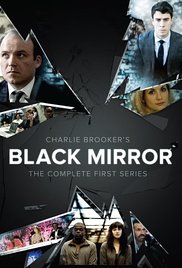Whenever our daughter comes home, we invariably end up watching TV shows that are edgy, leading edge, and mind-blowing. Netflix’s original series Black Mirror is referred to as an “updated Twilight Zone,” but far exceeds its predecessor. Like Twilight Zone, each episode is a unique story, with different characters and a different storyline. But the overall theme is the dark underbelly of technology.
You can tune in anywhere in this show’s three seasons and not miss anything because each episode is a full story and not dependent on the story that came before it. This evening, we binged and watched three episodes. I’m now convinced that Netflix is changing the landscape of TV programming. Any of the episodes we watched could be developed into movies.
In season 3, episode 4 – San Junipero, we’re treated to a version of the afterlife created by technology. It’s a beach town with eerie parallels to every bad TV movie you’ve ever seen about wild spring breaks in beach towns. But in this episode, set in the late 1980s, a black woman and a white woman fall in love.
We’re initially led to believe that everyone in this town is a time traveler, but come to discover that San Junipero is an afterlife construction created by humans in an evolved future time. People who are dying are permitted to visit the town five hours a week – a visit accomplished through an electrode technology. They then decide whether San Junipero is where they want to live in the afterlife or whether they prefer to move on into whatever lies beyond it.
The world of San Junipero bears striking parallels to the afterlife depicted in What Dreams May Come and in the Seth material, where thoughts are instantly manifested into a physical reality. But what makes this San Junipero radically different is the emotional interaction among the characters.
This series begs the question: are the writers, through their creativity, tuning into a possible version of the afterlife? And, if so, what does that mean for the rest of us? Is our belief about the afterlife what we experience when we die? Or is there some uniformly static version of the afterlife, as in the religious depiction of heaven and hell?
In another episode, Be Right Back, a female artist loses her partner in a car accident. Her sister signs her up for a Beta version of a software program that enables her to communicate with him through an aggregate of traits collected from his online presence. Then she discovers another level to this software program that brings her dead partner back to life through a robotic entity similar to the entities in Westworld. One big problem: his emotional responses are stymied. There are some unusual twists in this episode that address human emotions versus what we put out of ourselves online.
TV series are now a world removed from the shows that have followed me throughout my life. In terms of my interests, we went from One Step Beyond and Twilight Zone to The Medium and X-Files and all this original programming from Netflix and HBO, House of Cards to Game of thrones, Bloodline to Black Mirror, The Fall to Orange Is the New Black. You need a lifetime just to have time to watch and absorb these ideas, another lifetime to read some of the amazing fiction that is being published (another post), and another lifetime just to write.









Definitely now on my “to watch” list! A comment relative to “…..the religious depiction of heaven and hell”. My older sister and her family live in MO. She is brilliant, a member of Mensa, a retired RN with a Masters in Nursing. She is a fundamental evangelical Bible Belt Baptist Christian. During one of our visits up there, she and I were discussing spiritual ideas, convictions, etc. (I did not share most of mine with her.) At some point she declared, “I believe in The Rapture!” I didn’t say anything. But a few moments later, I asked her, “What do you think is going to happen when you die?” She replied, “I’m going to heaven”. In a conversational tone, I asked her, “When your soul reaches heaven, what then?” She looked baffled and asked me, “What do you
mean?” Again conversationally, I asked, “Will you sit on the right hand of God? Float on a cloud holding a harp? Walk on streets of gold? What will you DO once you are in heaven? I’m curious about your thoughts concerning what will happen AFTER you get to heaven”. There was no sarcasm in my questions. I truly wanted to know her ideas about “heaven”. She said, “I don’t know”. And that ended our discussion because our husbands came in from their fishing trip. I cannot fathom having no personal idea, whether it turns out to be right or wrong, regarding the AfterLife. I find so very much comfort in my own belief construct, which has evolved based on my experiences as a medium with many entities who have crossed over. In any event, I will absolutely get
BLACK MIRROR!!!!!
Hmm, I will have to check this out!
Thanks for this, Trish. I will put this one on my favorites and after all the others I’m already addicted to, I’ll watch it! Right up my alley, as they say! 🙂
I’ve never watched ‘Black Mirror’, but ironically when I do watch shows from Netflix, or Stan, I watch them on my black mirror (my iPad).